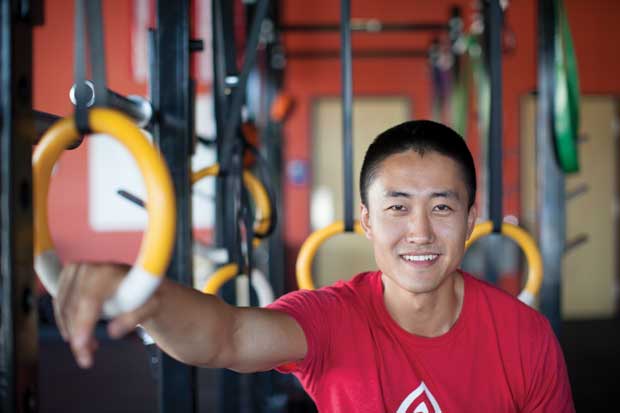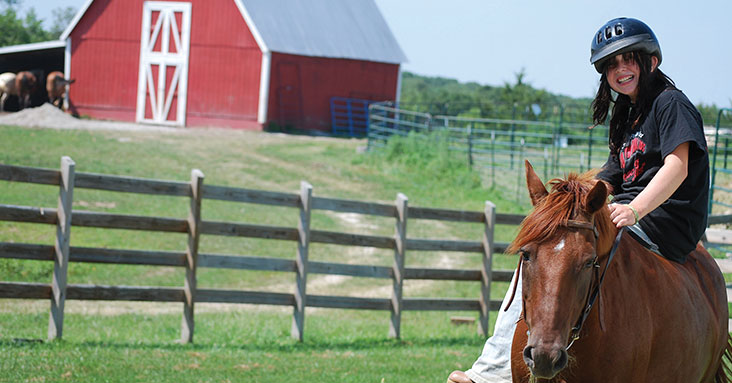A Whole New World
Creating hope, offering opportunity and building families through adoption
Every day, 5,760 children become orphaned as they lose one or both of their parents. In Africa alone, more than 2 million children become orphans each year. And in a recent report, UNICEF estimated that there are between 143 million and 210 million orphans across the globe, a number comparable to two-thirds of the entire U.S. population. A small percentage of those orphans get adopted, but according to Adam Pertman, author of Adoption Nation, the United States adopts more children — both internationally and domestically — than the rest of the world combined.
UNICEF estimates there are between 143 million and 210 million orphans across the globe, a number comparable to two-thirds of the entire U.S. population.
 Jack Jones personally knows the benefits of international adoption. When he was a child, his father protested the Chinese government and then became imprisoned and blacklisted by it and lost his esteemed position at a local university. When Jack publically parroted some of the things his father had said, fear rippled through the family. His mother warned him to be silent. Oppressed and out of options, Jack’s parents made the difficult decision to give their son a gift — the gift of a promising future. “They told me that I was going to go to America to have a better life,” Jack says.
Jack Jones personally knows the benefits of international adoption. When he was a child, his father protested the Chinese government and then became imprisoned and blacklisted by it and lost his esteemed position at a local university. When Jack publically parroted some of the things his father had said, fear rippled through the family. His mother warned him to be silent. Oppressed and out of options, Jack’s parents made the difficult decision to give their son a gift — the gift of a promising future. “They told me that I was going to go to America to have a better life,” Jack says.
After spending his first eight years in China, his parents placed him under the care of an adoptive mother in America. “You would think that an 8-year-old kid leaving his country and family would be sad or scared, but I just remember being really excited to come to America,” Jack says. “For me, it felt like America would be a lot like heaven; everything would be perfect.”
Jack’s transition to American life was not as jarring as he would have imagined. “I remember feeling almost like I had moved from China, but everyone was still the same, and I hadn’t actually moved,” he says. On the other hand, his biological mother cried so much in the days following her son’s departure that she developed a chronic watery left eye. Three years later, however, she also boarded a plane to America and frequently visited with her son.
 Although the shift from one country to another did not initially affect Jack, it did make a lasting impact on him. “I didn’t make as strong of a bond with people, especially adult figures,” he says. “I never really missed China, and I got along fine with my adoptive mom, but it hasn’t been a super close bond like I see between my friends and their moms. I don’t know if that’s just a mechanism your brain tells itself when it knows it’s going to leave everyone: ‘You shouldn’t create tight bonds because this might happen again.’”
Although the shift from one country to another did not initially affect Jack, it did make a lasting impact on him. “I didn’t make as strong of a bond with people, especially adult figures,” he says. “I never really missed China, and I got along fine with my adoptive mom, but it hasn’t been a super close bond like I see between my friends and their moms. I don’t know if that’s just a mechanism your brain tells itself when it knows it’s going to leave everyone: ‘You shouldn’t create tight bonds because this might happen again.’”
That fear of abandonment led Jack through low self-esteem and a series of depressive episodes that lasted until his mid-20s. Yet, since working through those issues, Jack has served in the U.S. National Guard, obtained a master’s degree in accounting, created a gaming website and given many motivational talks to youth. Additionally, his entrepreneurial spirit propelled him to the winner’s circle of the 2014 Stephens College #BOOM Competition, helping him open his own CrossFit gym off West Broadway. “I think part of it is having lived in China and seeing how not free you can be,” Jack says. “There’s all this opportunity here, so I should take advantage of it. My Chinese mom struggled with whether or not she made the right choice, but there has been so much opportunity in America, and that is an invaluable gift. I’m really grateful that I got that opportunity. In the end, it has definitely been worth it.”
Despite U.S. dominance in the adoption arena and testimonies such as Jack’s, international adoption has been tapering off in recent years. Fewer and fewer children are experiencing international adoption, partially because of increasing international regulations. Some countries, such as Ghana, Guatemala, Kazakhstan and Rwanda, have completely shut their doors to international adoption. Other nations have placed such rigid regulations on adoption laws that their doors might as well be closed to foreign countries. Effective in July, for instance, Colombia will no longer accept non-Colombian applications from families hoping to adopt a child younger than 6 years and 11 months old, unless it’s a child with special needs.
In 2011, Jack’s homeland began tacking on limitations to their laws as well. Single women are only allowed to adopt Chinese children with special needs, and the women must also sign an affidavit affirming to be heterosexual. China also forbids foreign adoptions to people who are morbidly obese or have facial deformities. If applicants suffer from blindness, schizophrenia or any terminal illness, their applications are also declined. Also, couples seeking to adopt must have been married for at least two years, a requirement that extends to five years if either of them was previously divorced. Not to mention, the families must have an annual income equal to $10,000 per family member and at least $80,000 in assets.
Due to these restrictions, the number of Chinese orphans has risen almost 50 percent in the past decade. Yet, the laws are not meant to stifle the adoption process. Instead, they’re intended to protect all parties involved. In fact, many of the countries are closing themselves to international adoption because of legitimate concerns that their orphans are actually victims of human trafficking.
When April Bass and her husband, Jamey, started pursuing adoption, they discovered this horrific reality for themselves. During her research, April found a correlation between the countries with the highest percentage of orphans reported and those with the highest percentage of black market baby selling reported. “It was incredibly discouraging to know that black market baby selling is rampant,” April says. “I can’t even imagine how heartbreaking that would be.”
Jamey echoes her sentiment: “In some countries, there’s a substantial amount of human trafficking, so it might be an illegal child you’re adopting, and you don’t even know it. It’s just an awful, awful situation.”
“I think the perception tends to make adoption look like it’s the mother’s decision. But it’s always been both of our plans to have multiple children and multiple adopted children.” — Jamey Bass

April and Jamey always knew they wanted to adopt children someday, but the goal was to have three biological children first. “I think the perception tends to make adoption look like it’s the mother’s decision,” Jamey says. “But it’s always been both of our plans to have multiple children and multiple adopted children.” Everything was going according to plan when they conceived their son, Everett. But in 2009, when Everett was only 16 months old, April was diagnosed with estrogen-based breast cancer. After months of chemotherapy and several surgeries, April opted for a hysterectomy to minimize the chance of recurrence. The procedure took place 10 days before her 30th birthday, putting her into post-menopausal life before her own mother.

“We wanted a big family, so having both ovaries removed was the most difficult choice I have ever made,” April says. “It changed my anatomy. It changed my hormones. It changed components of my entire body. But my concept of a family is possible regardless of my fertility.”
April conquered the illness in February 2010 and has since been on the road to recovery. Her last step in emotional healing is to grow her family through adoption. Yet, after the encroaching fears and difficulties of international adoption, she and Jamey began searching for their child on their own soil. “We thought originally about adopting internationally because we would look at conflicts and see parents being killed, but what do the children do?” she says. “There’s nothing; there’s no escape. And nationally, with domestic violence and drug abuse, there’s no escape for children either. It seems like so many of those situations are caused by adults, but the children suffer. It’s heartbreaking to see, so we just want to help in any way.”
 Another couple, Ryan and Amy Longenecker, experienced similar situations regarding both health and adoption. The couple dated for seven years before marrying and moving to Columbia in 1999. One year later, Amy needed major intestinal surgery. “We always knew we wanted to have children,” Amy says, “but we knew there was a possibility we wouldn’t be able to have a biological child because I have Crone’s disease.” Amy, who was diagnosed with the autoimmune disease when she was only 14 years old, had shouldered the weight of her possible infertility for more than a decade. Then after years of unsuccessful attempts to conceive a child, a fertility specialist confirmed her suspicions.
Another couple, Ryan and Amy Longenecker, experienced similar situations regarding both health and adoption. The couple dated for seven years before marrying and moving to Columbia in 1999. One year later, Amy needed major intestinal surgery. “We always knew we wanted to have children,” Amy says, “but we knew there was a possibility we wouldn’t be able to have a biological child because I have Crone’s disease.” Amy, who was diagnosed with the autoimmune disease when she was only 14 years old, had shouldered the weight of her possible infertility for more than a decade. Then after years of unsuccessful attempts to conceive a child, a fertility specialist confirmed her suspicions.
“For me, that was a weight lifted,” she says. “Always in the back of my mind, I’ve wondered if I could carry a child. I wondered if there was something wrong with me. Am I broken? And I took that weight on. So when the doctor said adoption was a great option, I was really excited.”
“We started researching, talking to people and sharing our heart for adoption. We never considered it a second option. It was how God wanted to build our family.” — Amy Longenecker
 After praying about the doctor’s recommendation, the couple eagerly dived into the adoption process. “We started researching, talking to people and sharing our heart for adoption,” Amy says. “We never considered it a second option. It was how God wanted to build our family.”
After praying about the doctor’s recommendation, the couple eagerly dived into the adoption process. “We started researching, talking to people and sharing our heart for adoption,” Amy says. “We never considered it a second option. It was how God wanted to build our family.”
Eventually, their research and connections led them to the Love Basket, a Christian adoption agency based out of St. Louis. There they met with a social worker to discuss their hopes and dreams in regard to building their family. “It can feel like a very arduous process,” Amy says. “You almost feel like you have to prove yourself and prove that you’re an able and capable parent. It can be very stressful. All around, it’s a really great thing, but in the middle of it, it can feel like a lot.”
Then, after the strenuous paperwork and a nail-biting waiting period, a birth mother selected them as the adoptive parents for a baby boy named Carter. Amy and Ryan rushed to the Joplin hospital, and the doctors brought the baby to them when he was merely 1 minute old. The birth mother even elected for Ryan to cut the umbilical cord. “The interesting thing about adoption is that everything before the adoption was Ryan’s and my journey,” Amy says. “It was our journey to becoming parents, our journey to adopt, our journey during the entire adoption process. But as soon as Carter was born, now it’s his story.”
A few years later, the story continued to develop as the Longenecker family began considering another adoption. Soon afterward, they brought home a baby girl named Isabelle. Although Carter was diagnosed with autism when he was 3 years old, the connection he has with his sister transcends his typical social struggles. “With Isabelle, it’s so cool because he has this true social-emotional connection with her that grows every day,” Amy says.
 Not only do Carter and Isabelle wield huge hearts and an incredible capacity to love, but they are also musically gifted, a talent they share with their biological families. And through the gift of open adoptions, it’s a talent they frequently share with each other in person. “Adoption does not define either one of our kids,” Amy says. “It doesn’t define our family. But it is a piece of all of us, and the biggest blessing we’ve had is the beauty of an open adoption. Their biological families have given us such a gift. We could say thank you every day, and it’s not enough. Carter and Isabelle do feel like our own children, but we wanted them to always know they were adopted, to know how they became a part of our family and to help them see the beauty in that.”
Not only do Carter and Isabelle wield huge hearts and an incredible capacity to love, but they are also musically gifted, a talent they share with their biological families. And through the gift of open adoptions, it’s a talent they frequently share with each other in person. “Adoption does not define either one of our kids,” Amy says. “It doesn’t define our family. But it is a piece of all of us, and the biggest blessing we’ve had is the beauty of an open adoption. Their biological families have given us such a gift. We could say thank you every day, and it’s not enough. Carter and Isabelle do feel like our own children, but we wanted them to always know they were adopted, to know how they became a part of our family and to help them see the beauty in that.”
Sidebar: Adoption Agencies
A Gift of Hope Adoptions
2401 Bernadette Dr. #209a
Columbia, Mo 65203
Phone: 573-356-0025
Website: agiftofhopeadoption.com
Facebook: www.facebook.com/aGiftofHopeAdoptions
The Love Basket
10306 Business 21
Hillsboro, MO 63050
Phone: 636-797-4100
Email: [email protected]
Website: www.lovebasket.org
Lutheran Family and Children’s Services of Missouri
401 W Blvd N # B
Columbia, MO 65203
Phone: 573-815-9955
Website: www.lfcsmo.org
Facebook:facebook.com/pages/Lutheran-Family-and-Childrens-Services-of-Missouri-MidMissouri
American Adoptions
1125 Grand Boulevard
Suite 1301
Kansas City, MO 64106
Phone: 1-800-236-7846
Website: missouri.adoption.americanadoptions.com
Children’s Home Society of Missouri
1167 Corporate Lake Drive
St. Louis, MO 63132
Phone: 314-968-2350
Website: www.chsmo.org
Children’s Hope International
11780 Borman Dr.
St. Louis, MO 63146
Phone: 1-888-899-2349
Website: adopt.childrenshope.net
Facebook: facebook.com/ChildrensHope



